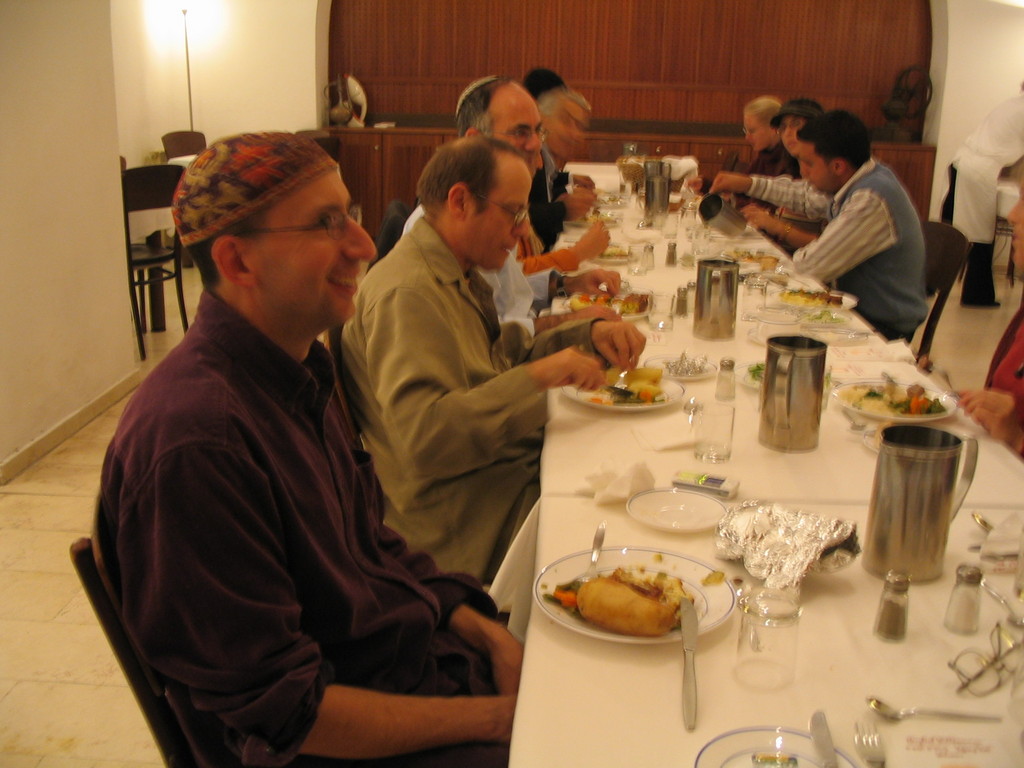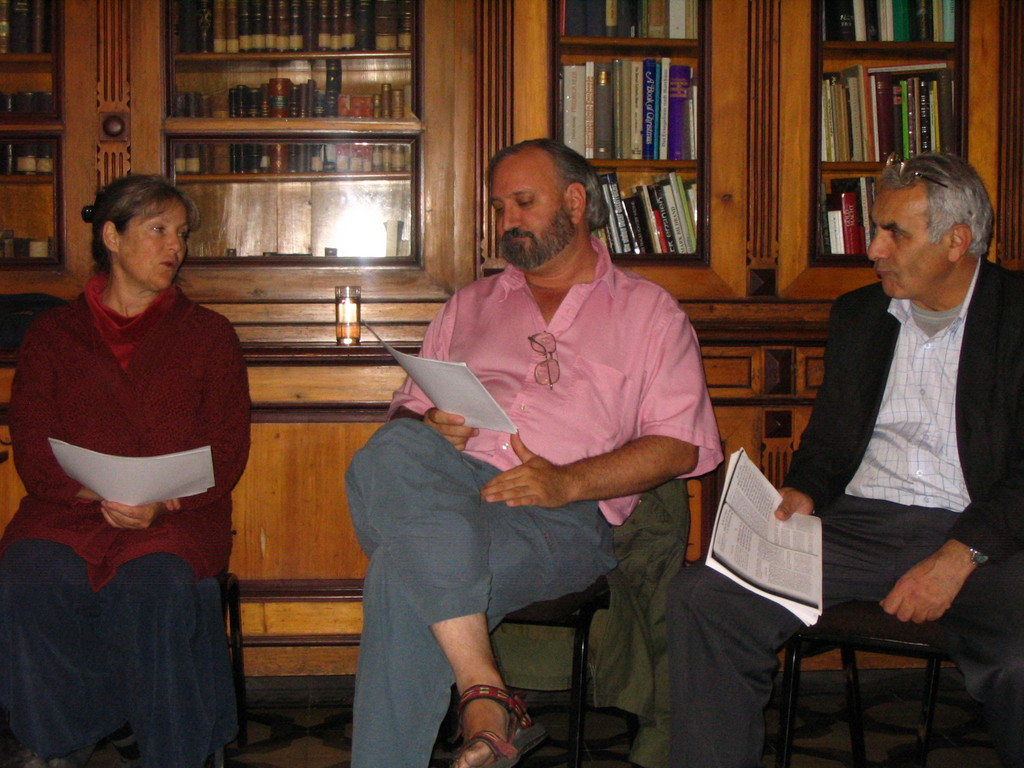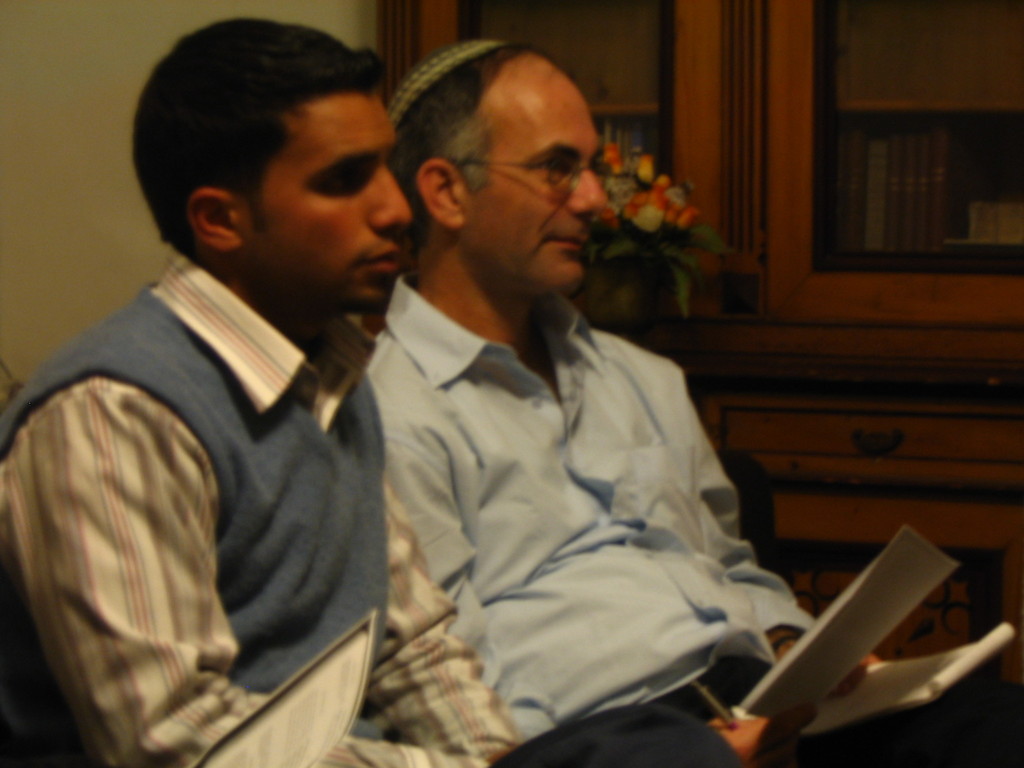By Dr. Yehuda Stolov | Executive Director
The Binding of Isaac/ Ishmael in Judaism, Christianity and Islam
A joint Israeli-Palestinian interfaith retreat of Palestinian Peace Society and Interfaith Encounter Association November 29th-30th at the Austrian Hospice
The retreat started with the introduction of the two organizations and their approaches to building peace in the region. It was remarkable to see how both organizations share so much in common in that regard. Both talked about their commitment to the promotion of peace, about the need to include in the process all ideologies, religions. Political views etc, and both spoke to the necessity of building the grass-roots infrastructure without which peace can not stand and of the power of encounter and mutual acquaintance in constructing mutual trust. The Palestinian Peace Society is based in Hebron and works since 1993 and the Interfaith Encounter Association is based in Jerusalem and works since 2001.
Then each of us introduced himself or herself and we shared a personal story in which someone sacrificed something for us.
Then we continued with the three religious focuses on the theme. First was the Jewish perspective and unlike the usual model where we have a short presentation first and then a conversation, this time they were combined thanks to the decision of the presenter Rabbi Bob Carroll to conduct the presentation around joint reading – that soon became joint learning – of the biblical text. We read the text in Hebrew and English and translated it into Arabic too. Here are some points that came up in the presentation and conversation: • Our venue at the heart of the Old City is perfect for the theme as in the Jewish tradition the binding took place just some two hundred meters from here… • Unlike many other religions (Christianity, Buddhism and others) where the founder spreads his message through disciples, Abraham spreads the message through his children – which could be problematic, as anyone who raised children knows. But on the other hand: if a disciple does not believe any more in the message – he is no longer part of the group; when family one continues to love even if they do not follow the message. • In fact, in Judaism Ishmael was also about to be sacrificed when he was sent to the desert with Hagar. And both gained from this event too: Hagar was awarded a conversation with the angel and Ishmael was purified through his desert experience to the degree he could grow into a nation. In Islam: Hagar asked Abraham why he leaves them in the desert but when he answered that it was the command of God – she accepted it. • Abraham was willing to sacrifice his whole future without any argument, out of his full belief in God. This resulted in the future becoming of the place of the binding into the Temple. Kierkegaard wrote a book about the Binding. He says that it is easier to justify God by saying that he never meant for a real sacrifice – only to try Abraham; but how can we justify Abraham? He answers that if Abraham had refused we may have applaud him as caring for his son, but what he chose to do was not to effuse to identification with human suffering throughout human history and this is a much more meaningful act. We had a long conversation about full obedience to God versus arguing with Him. We mentioned Abraham's argument about the destruction of Sodom, Moses' argument that prevented the destruction of the Nation of Israel, the argument of Prophet Muhammad encouraged by Moses to ask for reducing the number of daily prayers from 500 to 50 to 5, and the criticism on Noah who did not argue when God told him to prepare for the coming flood.
The second session focused on Christianity and was presented by Kerstin. Kerstin pointed out the interesting fact that we kept speaking about "sacrifice" which is the Christian term, instead of the Jewish term of "binding". In Judaism Isaac is 37 years old and definitely can not be forced by the 137 years old Abraham. In Islam too: Ishmael was a young adult. The agreement to be sacrificed came out of deep faithfulness. In contrast: in Christianity the emphasis is on the sacrifice and Isaac is portrayed as a small child. The old approach interpreted the sacrifice as working against human sacrifices but it is now clear that human sacrifices were not common in the time of Abraham, which can also be understood from Isaac's question about the lamb for the sacrifice. The new interpretation talks about trying Abraham and Isaac. This is being connected to Jesus who was actually sacrificed y his father in order to grant forgiveness for the sins of humanity. Christianity makes a direct link between Moriya and Golgotha. For example: Rembrandt paints the sacrifice and the crucifixion in very similar way: the cloths, colors, light emanating etc.) The conversation following the presentation touched on issues as: animal and plant sacrifices, Messiah and the Temple, and charity.
The perspective of Islam was presented by Dr. Taleb Alharithy. It talks about Abraham coming to Ishmael and telling him that he saw in his dream that he has to sacrifice him and about Ishmael accepting. In memory of this event Muslims celebrate Eid el-Adha – the Holiday of the Sacrifice. In this Holiday every Muslim who can in obliged to take part in sacrificing one of a few kinds of animals (a lamb for one family, a cow for seven families etc.). There are many details for the right sacrifice: the animal has to be healthy and not crippled, the slaughtering has to take place after sunset and after the prayer, it is preferable for the person to slaughter himself but it is possible to hire a slaughterer – however without paying him anything. One should select the healthiest and heaviest of his animals, which are at the minimum age of: six months for a lamb, a year for a goat, two years for a cow and five years for a camel. The meat should be mainly given to the poor. It is best to give it all to charity but it can be divided up to a third for himself, a third for his friends and a third for charity – definitely not more than a third for himself. On that day: a animal should not see another animal being slaughtered, the slaughtering has to be very swift with an especially sharp knife, which should not be sharpened in front of the animal who should not be facing Mecca. It is forbidden to sell anything – not even the skin or the bones. In Saudi Arabia the meat of the millions of pilgrims is collected, being frozen and sent to poor Muslim countries. The conversation then touched upon: vegetarianism, eating meat as sublimation of violence, prophets and the interesting point that from a Muslim perspective it is not important is the son was Isaac or Ishmael as both are equally respected as prophets.
We concluded the retreat with a joint delicious lunch and with gratitude to the Austrian Hospice for their wonderful hospitality.
Project reports on GlobalGiving are posted directly to globalgiving.org by Project Leaders as they are completed, generally every 3-4 months. To protect the integrity of these documents, GlobalGiving does not alter them; therefore you may find some language or formatting issues.
If you donate to this project or have donated to this project, you can receive an email when this project posts a report. You can also subscribe for reports without donating.
Support this important cause by creating a personalized fundraising page.
Start a Fundraiser

